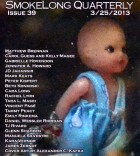There is a wonderful ruminative quality of this story. Everything we see in the outside world is colored by the character’s thoughts. For me, it grew progressively darker, ending with words like “skeletal,” “hovering,” and “sky rats.” I kept wondering, who is this guy?
In a way, it’s me. At least, the beginnings are me. I was training for a half marathon at the time, and the best track in Houston was around Rice University, a wealthy private school in a rich part of town. I’d run down to Rice from my shitty neighborhood and immediately be surrounded by all this morally repellant capitalism that is simultaneously visually stunning. I couldn’t help but love the beauty of the homes even while being disgusted by whatever evils paid for them.
A lot of exercisers monitor their heart rate (so I’m told) but for me, this character’s preoccupation with his heart rate was disturbing. The simple act of not picking up that pacifier in order to maintain the heart rate set me to wondering how he weighs the needs of others with his own.
When you’re running around a track or ricocheting through American detritus it’s easy to perceive yourself as a nation alone. People may be suffering, little losses like a baby’s pacifier or a worker falling from a hospital he could never afford to visit, but we shut them out because it might inconvenience us, or ruin our sense of daily rhythm. It’s easy to criticize the rich, sure, and many of them deserve it, but even us people of little means carry chains of little grievances we’ve committed around with us.
The title adds yet another layer and an additional understanding of the character. At the same time, it doesn’t feel too obvious or expected. I’m curious: how early in the process of writing the story did the word “Interference” seem like the right choice?
I wish I was better at saving my rough drafts—I sort of seem to remember it having a more image-rooted title. Alas! It was pretty early on in the process, since I can’t remember what else it could have been called. In flash, more than a full length story (and this is the same in poetry), you’ve got such a small number of words to work with, and more weight rests on the title. It functions as the haze that drapes over the story—everything in the story is seen through it and altered by it.
You are a poet, correct? The words flow so beautifully in this story. How does writing prose and poetry compare for you, in terms of attention to the rhythm and flow of words?
In both my poetry and prose I begin on the level of the sentence. That is, I have a file on my computer (called aaaaa.docx so that it’s always first alphabetically) that contains a bunch of sentences I think of that I want to use. If I use one of the sentences in a poem, I’ve got to create the rhythm around that line, even if it gets enjambed. For fiction, it’s more of a tonal key that it sets for the piece, though I do like to toy with syntax to create a rhythmic dissonance.


